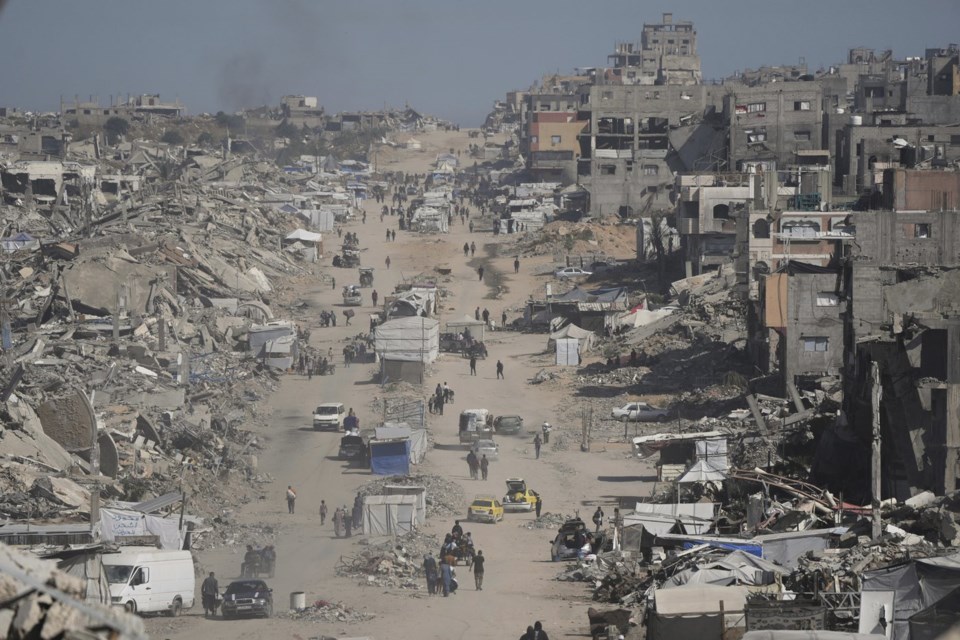DEIR AL-BALAH, Gaza Strip (AP) — At least 93 people were killed by Israeli strikes in Gaza on Friday as U.S. President Donald Trump wrapped up his regional trip.
Strikes overnight hit across Gaza, including the outskirts of Deir al-Balah and the city of Khan Younis. Gaza's health ministry said hundreds more were injured in addition to those killed.
The widespread attacks across come as Trump finishes his visit to Gulf states but not Israel. There had been widespread hope that his regional trip could usher in a ceasefire deal or renewal of humanitarian aid to Gaza. An Israeli blockade of the territory is now in its third month.
Speaking to reporters at a business forum in Abu Dhabi on the final day of his trip, Trump said he was looking to resolve a range of global crises, including Gaza. “We’re looking at Gaza,” he said. “And we’ve got to get that taken care of. A lot of people are starving. A lot of people are — there’s a lot of bad things going on.”
Israel said Friday it was continuing its operations against militants in Gaza and that it struck 150 targets in the past day, including anti-tank missile posts and military structures. In northern Gaza, it eliminated several militants who were operating in an observation compound, it said.
The strikes lasted for hours into Friday morning and sent people fleeing from the Jabaliya refugee camp and the town of Beit Lahiya. They followed days of similar attacks that killed more than 130 people, according to Gaza’s Health Ministry.
After the strikes, dark smoke was seen rising over Jabaliya as people grabbed what they could of their belongings and fled on donkey carts, by car and foot.
“The army entered upon us, bombing, killing. ... We got out of the house with difficulty, killing and death, we did not take anything,” said Feisal Al-Attar, who was displaced from Beit Lahiya.
Netanyahu vows to step up war
Israeli Prime Minister Benjamin Netanyahu vowed earlier in the week to push ahead with a promised escalation of force in Israel’s war in the Gaza Strip to pursue his aim of destroying the Hamas militant group, which governs Gaza.
In comments released by Netanyahu’s office Tuesday, the prime minister said Israeli forces were days away from entering Gaza “with great strength to complete the mission ... It means destroying Hamas.”
An Israeli official said the strikes on Friday were preparatory actions in the lead-up to a larger operation and to send a message to Hamas that it will begin soon if there isn’t an agreement to release hostages. The official was not authorized to brief media and spoke on condition of anonymity
The same official said that Cabinet members were meeting Friday to assess the negotiations in Qatar, where ceasefire talks are taking place, and to decide on next steps.
Israeli government spokesman David Mencer told The Associated Press on Friday that Israel’s military is intensifying its operations as it has done since Hamas stopped releasing hostages. “Our objective is to get them home and get Hamas to relinquish power,” he said. He said Israel will continue pressuring Hamas while negotiating, saying that it's getting results.
‘Historic opportunity’
On Friday, families of the hostages said they awoke up with “heavy hearts” to reports of increased attacks and called on Netanyahu to “join hands” with Trump’s efforts to release the hostages.
“Missing this historic opportunity for a deal to bring the hostages home would be a resounding failure that will be remembered in infamy forever,” the families said in a statement released by the hostage forum, which supports them.
The war began when Hamas-led militants killed 1,200 people in an Oct. 7, 2023, intrusion into southern Israel. Israel’s retaliatory offensive has killed more than 53,000 Palestinians, many of them women and children, according to Gaza’s Health Ministry, which does not say how many were combatants. Almost 3,000 have been killed since Israel broke a ceasefire on March 18, the ministry said.
Hamas still holds 58 of the roughly 250 hostages it took during its attack on Israel, with 23 believed to still be alive, although Israeli authorities have expressed concern for the status of three of those.
Gaza blockade enters third month
The attacks come as Israel enters its third month of blockading Gaza, preventing food, fuel medicine and all other supplies from entering, worsening a humanitarian crisis. Israel says the blockade aims to pressure Hamas to release the hostages it still holds and that it won’t allow aid S
Earlier this week, a new humanitarian organization that has U.S. backing to take over aid delivery said it expects to begin operations before the end of the month — after what it describes as key agreements from Israeli officials.
A statement from the group, called the Gaza Humanitarian Foundation, identified several U.S. military veterans, former humanitarian coordinators and security contractors that it said would lead the delivery effort.
Many in the humanitarian community, including the U.N., said the system does not align with humanitarian principles and won't be able to meet the needs of Palestinians in Gaza and won't participate it.
——
Mroue reported from Beirut. Associated Press writers Tia Goldenberg and Sam Mednick in Tel Aviv, Israel, contributed to this report.
——
Follow AP’s war coverage at https://apnews.com/hub/israel-hamas-war
Wafaa Shurafa And Bassem Mroue, The Associated Press


